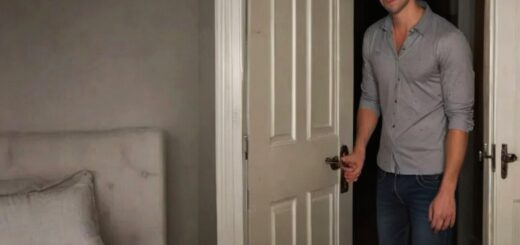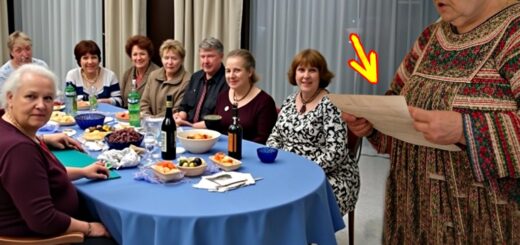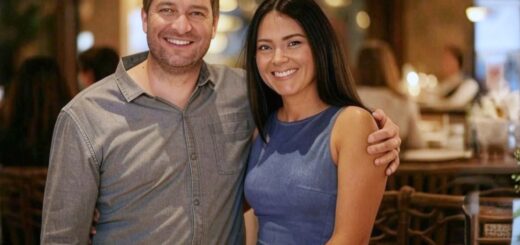After my mother’s funeral, I inherited her favorite but old painting, while my sister got her three vacation homes…
She hid the key in the most reliable place she knew—in her work box with book restoration tools, among scalpels, bone folders, and jars of glue. Alex never went there, considering her work boring and dusty fuss. She spent the whole next day in a fog.
She needed to do something. Fear mixed with desperate, irrational hope. What if it was some mistake, an old key from a souvenir box once produced by the famous factory? But intuition said no.
Mom wouldn’t hide a trinket with such ingenuity. In the evening, when it became clear that Alex wouldn’t appear today either, she sat down at the computer. With trembling fingers, she typed into the search engine Appalachian Gems private deposits vault.
The first few links led to historical articles and collector forums. Everything confirmed what she knew—the association was disbanded in the early 90s. But then she stumbled upon a short note in a local business publication.
It said that on the basis of the former main vault of Gems, a private company was created that inherited part of the obligations and infrastructure. The company was called Hudson Capital Vaults. The address was given.
Old center of New York. In the morning, Elena dressed in the simplest and most inconspicuous thing she had—dark jeans, gray sweater. She put the key in the inner pocket of her jacket.
Her heart pounded so hard it seemed everyone around could hear it. She rode in a crowded subway, looking at the passing streets, and felt like a heroine in a spy novel. Only this wasn’t a game.
This was her life. The building was exactly as she imagined. An old monumental facade of gray granite but with new tinted glass and a shiny steel sign.
No pomp. Just cold, confident reliability. Inside, a security guard met her behind a bulletproof glass counter.
I would like, Elena began, and her voice treacherously trembled. I have a key to a box. An old box.
The guard gave her an indifferent look. To the manager. Second door on the right.
The manager’s office was small but furnished with expensive minimalist furniture. Behind the desk sat an elderly, very neat man in a perfect suit. He looked at Elena over thin-rimmed glasses.
I’m listening. Elena silently approached the desk and placed the key in front of him. She didn’t know what to say and decided that this item would say everything for her.
The man took the key. Not a muscle twitched on his face. He turned it in his hands, carefully examined the logo.
Then he raised his eyes to Elena, and something new appeared in his gaze. Surprise mixed with respect. Where did you get this? he asked quietly, almost in a whisper.
It’s an inheritance, Elena replied. He nodded as if this answer fully satisfied him. I haven’t seen such keys for 30 years probably.
From those times. We thought all boxes of this type were long closed or their contents transferred to the State Archive as unclaimed. There’s a number on the key.
Let’s see. He typed something on his computer keyboard, peering at the screen. Elena held her breath.
Yes, there is one. He looked at her again. Box number 773, registered in the name of Mary Harper.
Your mother? Elena nodded silently, feeling a chill run down her spine. Well, by law, you are the heir. Follow me.
They walked down a long quiet corridor. The manager opened a heavy grille door like in a bank vault. Behind it was the vault itself.
A huge room with high ceilings, along the walls of which stretched endless rows of metal boxes from small to huge. The air was cold, still, and smelled of metal and dust. The sound of their steps echoed off the walls.
Their box was in the farthest, dimly lit corner. It was covered with a layer of dust that no one had wiped for many years. The manager pointed to two locks.
One mine, the second yours. He inserted his key and turned it. Then he stepped back.
Further, you yourself. Elena’s hands trembled so much that she barely got the key into the keyhole. The old mechanism gave way not immediately, with a dry screech.
The click of the lock sounded in the silence like a shot. She pulled the small metal door toward herself. Her heart froze in anticipation.
She imagined anything—velvet pouches with jewels, stacks of old money, maybe even gold bars. Stories about Gems stirred the imagination. She pulled out the metal drawer.
And disappointment hit her like a physical blow. It was almost empty. And offensively light.
No pouches, no gold. At the bottom lay only a small plump notebook in a worn leather cover and one single document, folded in four, yellowed from time. And that’s all, it flashed in her head.
The whole secret, all hopes, the whole path for an old notebook and a piece of paper? She felt like a complete fool. Probably Alex was right. Her mother really was strange, and all this was just some sentimental nonsense.
She sat on a low bench by the wall and took the document in her hands. It was an official form with pre-revolutionary lettering. The paper was thick, expensive.
Elena unfolded it. At the top was a seal and the name of some private gallery long gone. She began to read the typewritten text, struggling to make out the faded letters.
It was a certificate of authenticity and a sales contract dated 1928. The document stated that the painting called «Autumn Landscape» was actually a work by the famous avant-garde artist Vincent Sinclair titled «Last Dawn.» Next came a detailed description of the canvas, size, brush technique, and expert conclusion.
And at the very bottom, in the notes column, it said considered lost during the revolution years. Authenticity is beyond doubt. Elena reread it several times.
Vincent Sinclair. She knew this name. One of the pillars of American avant-garde whose works fetched millions at auctions.
Paintings considered lost were priceless. She set aside the certificate and took the leather notebook in her hands. It was a bookkeeping ledger, only very small.
She opened it. Inside, in her mother’s neat, tiny handwriting, dozens of pages were filled. But these were not words.
These were columns of dates, some codes, city names, surnames, abbreviations. A seemingly meaningless set of data. Elena sat in the cold, echoing vault, and the world around her turned upside down.
She looked at the certificate, then at the mysterious notebook. And she understood. Mom didn’t leave her a pile of gold.
She didn’t leave her money. She left her evidence. Evidence that the dark, dusty canvas now lying under her bed wrapped in an old blanket was not junk.
It was not sentimental daub. It was a masterpiece that the whole world had been searching for a hundred years. The inheritance was not in this box.
The inheritance had hung on the wall in her house all this time. Hiding in plain sight. As soon as Elena left the cold, echoing vault onto the sunlit street, the world seemed different to her.
Unreal. People hurried about their business, cars honked, the city lived its usual life, and no one knew that a modest woman in a gray sweater carried in her bag a secret worth millions. She clutched the bag to her side as if afraid the documents might evaporate or someone might read her thoughts and understand what she was carrying…
























